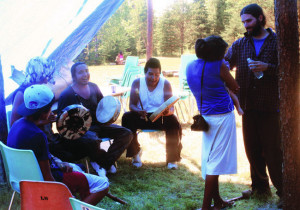Grassy Narrows young people learn about land and water issues while camping at blockade
A small group of young people are camping for three days out at the site of the decade-long forestry blockade at Slant Lake at Grassy Narrows First Nation to learn about the importance of water in aboriginal culture and way of life.
The Grassy Narrows Youth Gathering has been held off-and-on in the First Nation community for about 12 years and is organized by the Michael Sattler Peace Prize-winning aboriginal rights activist Judy De Silva. The age of participants at the three-day long camp ranges from the very young to 30 years old and this year some have travelled from as far away as Sudbury for the event.
“The reason this gathering started is because we wanted to educate younger people about the issues going on with the water here around Turtle Island and around the world. And why it’s important to do things to protect the land,” said Edmund Jack, one of the camp’s organizers and a resident of Grassy Narrows.
Protecting water quality is an issue for many First Nations, but it strikes a chord with Grassy Narrows in particular because the community is still dealing with the fallout of mercury being introduced into their watershed in the 1960s from industrial sources. But Jack said the camp is not just encouraging vigilance and protection of the land, it’s about helping the young people who attend.
“As Anishinaabe people a lot of our values, traditions and teachings are all a part of the land and we have this gathering just to kind of exercise that. We’re not preaching to them about what they should and shouldn’t do. Instead we give them the values they’ll need to find what it is they should do, because right now a lot of our young people are lost, whether they’re lost in alcohol or even in video games or TV,” he said.
Over the three days, not only do the participants get a chance to have some fun camping out and swimming in the nearby lake, they have discussions about water issues, mining activities in the area, the pipeline plans and aboriginal rights ceremonies. There are also fish fries, a mini-powwow, team-building exercises, speakers from the Idle No More movement and even a talent show.
Realle Wapioke is a teenager from Shoal Lake 39 who travelled to Grassy for the camp. Wapioke is very interested in aboriginal water issues and is even planning on attending a second event in British Columbia on the same topic next month.
“I came out to have some fun and be close with nature, learn some teachings and be out with my friends. It’s nice to get a chance to get outside for once instead of being inside all summer. It’s good to sweat,” said Wapioke.
“I’m going to B.C. for a meeting about saving our water. I was only one of four people picked from those who sent their applications in.”
The camp at the blockade site wraps up on Thursday night.





